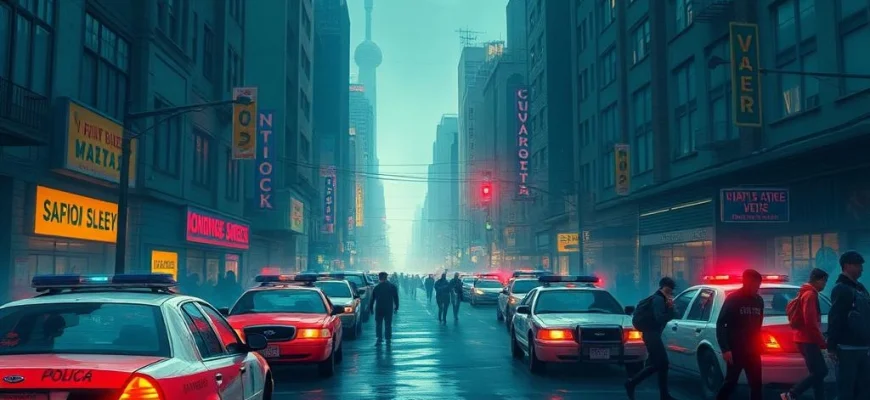If you loved the gritty, raw energy of 'Ley Lines' (1999), a gripping crime drama by Takashi Miike, you're in for a treat. This article explores 10 similar movies and shows that capture the same intensity, underground themes, and unflinching storytelling. Whether you're drawn to urban crime sagas or tales of marginalized youth, these picks will keep you hooked.

Tokyo Drifter (1966)
Description: A stylish, surreal crime film with a focus on existential themes and a protagonist navigating a world of shifting loyalties and violence. The visual aesthetic is bold and experimental, using color and composition to heighten the emotional tone.
Fact: The film was initially a commercial failure but later gained a cult following for its avant-garde approach to the yakuza genre. It features a memorable jazz-infused score that contrasts with its violent narrative.
 Watch Now
Watch Now 
Branded to Kill (1967)
Description: A subversive take on the hitman genre, blending absurdity with brutal violence. The film explores themes of obsession, identity, and the absurdity of human existence, all wrapped in a visually striking package.
Fact: The director was reportedly fired by the studio after the film's release due to its unconventional style. The protagonist's obsession with the smell of boiling rice became one of the film's most iconic quirks.
 Watch Now
Watch Now 
Violent Cop (1989)
Description: A gritty, nihilistic crime drama that delves into the moral decay of its characters. The film's raw, unfiltered portrayal of violence and its exploration of a protagonist on the edge of sanity create a tense, unsettling atmosphere.
Fact: This was the directorial debut of a renowned actor, marking a significant shift in his career. The film's production was notoriously chaotic, with the director rewriting the script daily.
 Watch Now
Watch Now 
Boiling Point (1990)
Description: A tense, character-driven crime film that examines the pressures and conflicts within a small group of individuals. The narrative builds slowly but erupts into violence, mirroring the emotional and psychological unraveling of its characters.
Fact: The film features long, unbroken takes that heighten the sense of realism and tension. It was shot on a modest budget but is praised for its intense performances and tight script.
 Watch Now
Watch Now 
Cure (1997)
Description: A psychological horror-thriller that explores the nature of evil and the fragility of the human mind. The film's slow-burning tension and ambiguous storytelling create a haunting, cerebral experience.
Fact: The film's minimalist score and atmospheric sound design are key to its unsettling tone. It was a critical success and is often cited as a masterpiece of Japanese horror.
 Watch Now
Watch Now 
Dead or Alive (1999)
Description: A hyper-stylized crime thriller that blends over-the-top action with deep existential themes. The film's frenetic pacing and surreal visuals create a dreamlike yet brutal world where characters are trapped in cycles of violence.
Fact: The opening sequence is one of the most fast-paced and chaotic in cinema history, setting the tone for the rest of the film. It was part of a trilogy, though each film stands alone narratively.
 Watch Now
Watch Now 
Pulse (2001)
Description: A haunting meditation on isolation and the existential dread of modern life, wrapped in a supernatural horror framework. The film's eerie, slow-building tension and bleak outlook resonate deeply.
Fact: The film's depiction of ghosts emerging from computer screens was groundbreaking at the time. It inspired an American remake, though the original is considered far superior.
 Watch Now
Watch Now 
Bright Future (2003)
Description: A dreamlike, melancholic exploration of youth, alienation, and the search for meaning. The film's ambiguous narrative and surreal imagery create a sense of unease and introspection.
Fact: The film features a haunting electronic score that complements its ethereal tone. It was shot on digital video, giving it a distinct, gritty visual style.
 Watch Now
Watch Now 
The World of Kanako (2014)
Description: A dark, frenetic crime thriller that delves into the twisted psyche of its protagonist. The film's non-linear storytelling and brutal violence are juxtaposed with moments of surreal beauty.
Fact: The film's editing style is highly kinetic, mirroring the protagonist's fractured mental state. It was based on a novel, but the adaptation takes significant liberties with the source material.
 Watch Now
Watch Now 
First Love (2019)
Description: A violent, yet oddly poetic crime romance that blends brutal action with tender moments of human connection. The film's chaotic energy and stylized violence are balanced by its emotional core.
Fact: The film was shot in just a few weeks, yet its action sequences are meticulously choreographed. It features a cameo by a legendary yakuza film actor, adding a layer of nostalgia for genre fans.
 Watch Now
Watch Now 








